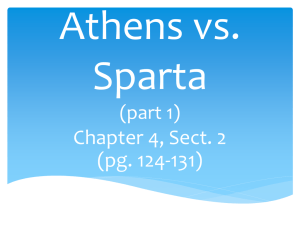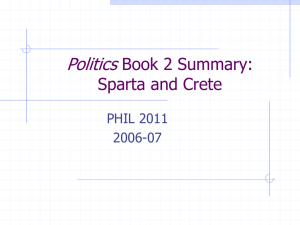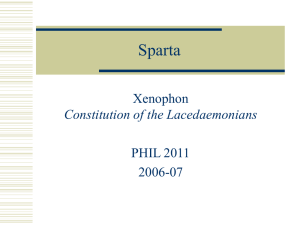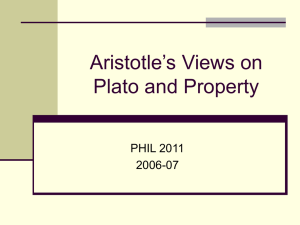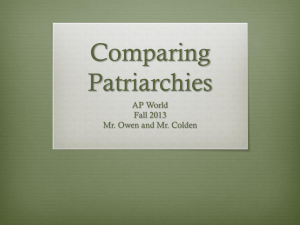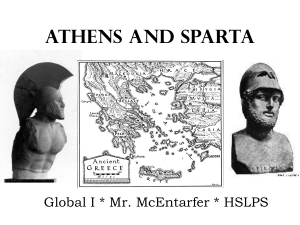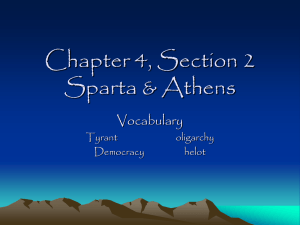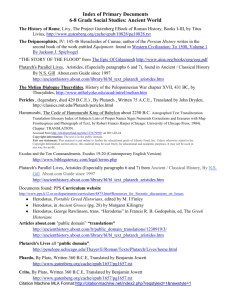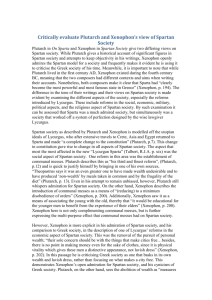Ancient Greek Views on Sparta: Plutarch, Aristotle & More
advertisement
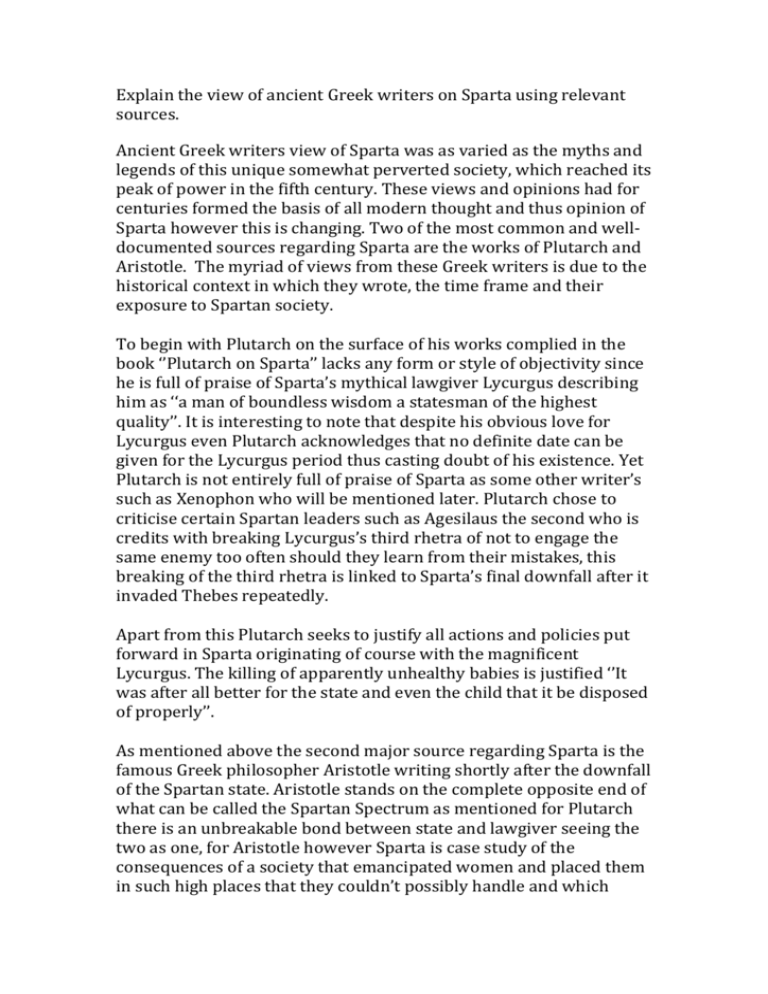
Explain the view of ancient Greek writers on Sparta using relevant sources. Ancient Greek writers view of Sparta was as varied as the myths and legends of this unique somewhat perverted society, which reached its peak of power in the fifth century. These views and opinions had for centuries formed the basis of all modern thought and thus opinion of Sparta however this is changing. Two of the most common and welldocumented sources regarding Sparta are the works of Plutarch and Aristotle. The myriad of views from these Greek writers is due to the historical context in which they wrote, the time frame and their exposure to Spartan society. To begin with Plutarch on the surface of his works complied in the book ‘’Plutarch on Sparta’’ lacks any form or style of objectivity since he is full of praise of Sparta’s mythical lawgiver Lycurgus describing him as ‘‘a man of boundless wisdom a statesman of the highest quality’’. It is interesting to note that despite his obvious love for Lycurgus even Plutarch acknowledges that no definite date can be given for the Lycurgus period thus casting doubt of his existence. Yet Plutarch is not entirely full of praise of Sparta as some other writer’s such as Xenophon who will be mentioned later. Plutarch chose to criticise certain Spartan leaders such as Agesilaus the second who is credits with breaking Lycurgus’s third rhetra of not to engage the same enemy too often should they learn from their mistakes, this breaking of the third rhetra is linked to Sparta’s final downfall after it invaded Thebes repeatedly. Apart from this Plutarch seeks to justify all actions and policies put forward in Sparta originating of course with the magnificent Lycurgus. The killing of apparently unhealthy babies is justified ‘’It was after all better for the state and even the child that it be disposed of properly’’. As mentioned above the second major source regarding Sparta is the famous Greek philosopher Aristotle writing shortly after the downfall of the Spartan state. Aristotle stands on the complete opposite end of what can be called the Spartan Spectrum as mentioned for Plutarch there is an unbreakable bond between state and lawgiver seeing the two as one, for Aristotle however Sparta is case study of the consequences of a society that emancipated women and placed them in such high places that they couldn’t possibly handle and which either way corrupted society. The problem as Aristotle saw it began with the Spartan policy of allowing women to own and run property should their husbands be absent, this as Aristotle saw it created total imbalance as women were not meant to run property this also had a sexual side as Aristotle saw it women running property lead to them having supreme authority over helot men whom they used for their own personal pleasure leading to the creation of a ‘’Bastard generation’’. In certain respects Aristotles writings are mostly useful only due to their close date after Sparta’s downfall thus giving the reader a source from the time, yet modern historian Paul Cartldege states ‘’Yet in regards to actual usefulness this is minimal’’ of course due to the fact that much of Aristotle’s works on Sparta is mere rambling of a misogynist who himself was struggling with his own perverted sexual habits. Another ancient writer with views on Sparta is one who predates both Plutarch and Aristotle his name was Herodotus. Herodotus known, as the father of history was the first person to document Spartan society, he also had the privilege of doing it during a momentous moment in it’s history for Herodotus was writing about Sparta during the Persian wars from 495 to 479. His documentation of ‘’world’’ history is useful mostly due to the context of his writing’s having being written during the wars, which threatened the very survival of the Spartan state a time when Spartan military fanaticism was at an all time high and heroism on full display as Herodotus states ‘’ fighting in their phalanx formation they were the finest soldiers in the world a true force to be reckoned with’’. Despite the context of his writtings which unlike some other writers chiefly Plutarch which were written centuries afterwards Herodotus’s views are also subject to criticism for example being a Greek himself inclines one to suppose that he will naturally favour the defenders of Greek culture over the no doubt ‘’Savage’’ Persian invaders. Furthermore many of his stories and accounts from battle are riddled with fantasy stories of flying dragons and giant moths leading to many simply calling Herodotus by his other famous name the father of lies. A final famous Greek writer on Sparta was the famed traveller Pausanias the geographer. Writing during the time of the so called five good emperors of Rome, Pausanias’s writtings while not having such a good contextual privilege when compared with Aristotle and Herodotus is no less important due to the fact that his writtings contradicted the works of many other Greek writers chiefly Plutarch who time and time again places great emphasise on the modesty of Spartan architecture this view of course penetrated the modern view of Sparta as being a society which deliberately turned it’s back on the intellectual and cultural life of ancient Greece. Pausanias presents to his audience a view of Sparta as a place where there existed many beautiful marble building’s made from material which could have only come from ancient Persia suggesting trade between the two states. He also describes in detail beautiful paintings and richly decorated houses and temples, this of course then cast doubt on the account of Plutarch where he describes Sparta as a modest state which placed all it’s emphasis on military and physical perfection and not on marvellous polis’s with richly decorated building’s houses and temple’s alike. In conclusion the views of ancient Greek writers view of Sparta is varied and is so due to the fact that writers were writing several centuries apart at times leading sometimes to contradictory accounts and have been ammunition for numerous history wars between historian’s which have occurred for centuries and will without a grain of doubt continue to occur well into the future.

